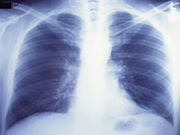Findings in patients treated with esomeprazole; likely due to pH-dependent solubility
WEDNESDAY, Feb. 10, 2016 (HealthDay News) — Cola intake leads to a clinically relevant and statistically significant increase in the bioavailability of erlotinib during esomeprazole treatment, according to a study published online Feb. 8 in the Journal of Clinical Oncology.
Roelof W.F. van Leeuwen, Pharm.D., from the Erasmus Medical Center Cancer Institute in Rotterdam, Netherlands, and colleagues conducted a randomized, cross-over, pharmacokinetic study of 28 patients with non-small-cell lung cancer. Intrapatient differences were evaluated for absorption (area under the plasma concentration time curve [AUC0-12h]) after a seven-day period of concomitant treatment with erlotinib, with or without esomeprazole, with either cola or water.
The researchers found that in patients treated with erlotinib and esomeprazole with cola, the mean AUC0-12h increased 39 percent (P = 0.004). However, in patients not treated with esomeprazole, the mean AUC0-12h was only slightly higher (9 percent; P = 0.03) after erlotinib intake with cola.
“Potentially, the effects of cola on erlotinib exposure may be extrapolated to other tyrosine kinase inhibitors with a pH-dependent solubility (e.g., dasatinib, gefitinib, nilotinib), but this remains to be evaluated in future studies,” the authors write. “Furthermore, other acidic beverages (i.e., orange juice, other carbonated drinks) may have similar effects as cola and should be explored in future trials.”
Abstract
Full Text (subscription or payment may be required)
Copyright © 2016 HealthDay. All rights reserved.








